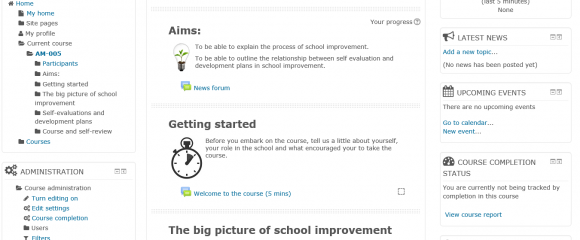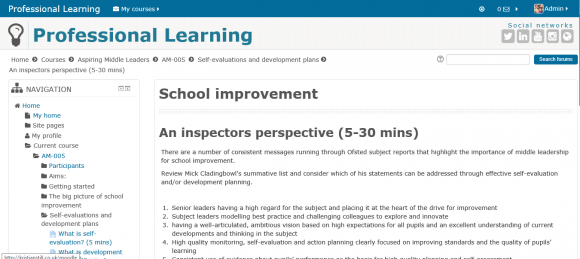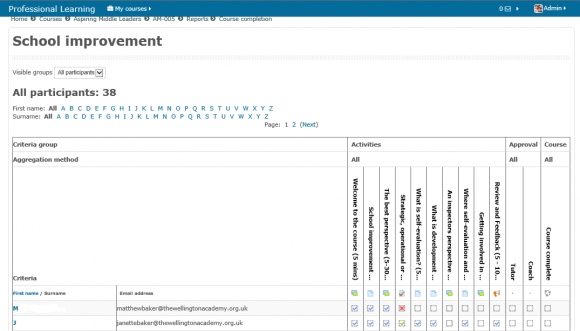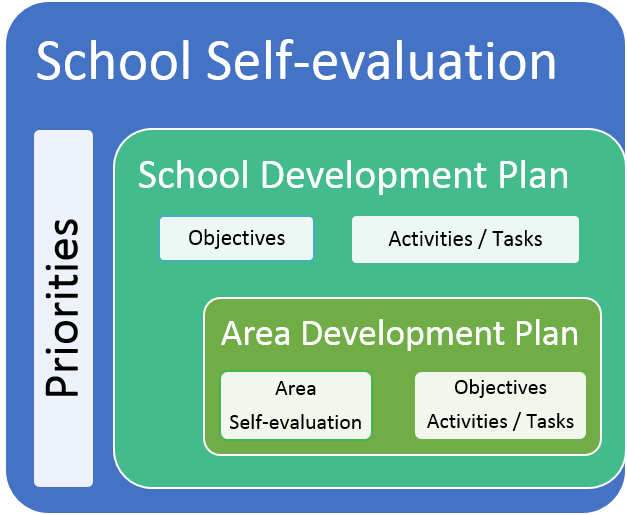For the past two months I have been working on three Professional Development (PD) courses, crafted and shared with our middle leaders, online. The model is relatively simple. There are three roles, participants, coaches and tutors. Tutors administer the course (that is me). Participants securing a leadership coach from the SLT, which meant at our Academy, each Senior Leader is coaching their lines. However, in one or two the larger Curriculum Areas, the Curriculum Leader completed the course and then recruited their 2iC to the course and is coaching them.
Participants complete the course the readings and activities, and guided by their coach, draft their school improvement documents, self-certificating at the end. The proof, they say, is in the eating.
| (Q) What was your overall experience of the course? | |
|---|---|
| – Excellent. I would consider recommending this course to a colleague. (4): | 2 (14.29 %) |
| – The course was informative and will impact on my professional practice. (3): | 10 (71.43 %) |
| – The course was worthwhile. (2): | 2 (14.29 %) |
| – The course did not develop my professional understanding of this topic. (1): | |
| Average: 3.00 | |
So far the feedback has been very promising. The increased flexibility of online learning seems to be the main benefit, the when and where staff get their leadership PD. Second, the discussion seems to the key. The ability to read / see what other middle leaders are thinking / feeling about a particular task or discussion point is important.
I like the way that the course makes you reflect. I especially like the forums as it gives an insight into the way other middle leaders want to drive their departments forward and allows you a framework to give opinions objectively promoting agreements and in some cases debate. It also encourages you to actively think about you want from your department. – Course feedback
Interestingly, we are always asking for impact. Below are the first five responses. I let you draw your own conclusions.
| (Q) How will the course impact on your current or future roles and responsibilities? | |
|---|---|
| – | It has given me a platform to want to progress by thinking outside if the box and about wider school issues. |
| – | It will further help me with completing self evaluation accurately for the department. This will make it a more meaningful task. |
| – | It will help me to distinguish between the different parts of my role as well as helping me understand where self-evaluation fits in the bigger picture of school improvement. |
| – | Acting as a future coach to staff in science dept will be useful. |
| – | Very similar to the NPQML and the information you are provided with on the course. Useful to feedback to team and coach subject leader through the process. |
| – | It was interesting getting not only the theory but also the experiences of my colleagues. |
Finally, the personalisation / self-pacing an added bonus. One issue that was pointed out – the course is very public, forums contributions and certificating, are public activities. We made participation in the forums compulsory. Should course completion be possible for the those that just want to lurk?
From a tutors / coaches point of view, having the course supporting the process of School Improvement (Self-evaluations and Development Planning), really shift the relationship I had with my line. With my three lines – the development of conversations was almost identical.
- what was working on the course, what interested them (forum discussions predominantly).
- how to write the documents
- how to action the document / how to apply their leadership to the process
In the main, our initial conversations were about the course, their successes, as well as the “issues” or stumbling blocks” they were facing in understanding school improvement. Having read the forums, I was in a privileged position, I already partly understood their misconceptions or appreciated their points of view. Next we discussed the formal process of writing of the self-evaluation / development plan. More importantly, towards the mid-point of the process we started discussing “how” they were going lead, respond, work with their teams, to address the areas for improvement, to drive the improvement, they had identified and prioritised in their written documents. The conversation was less about the plans and more about leadership. Precisely, their leadership, leadership of their teams, using a common language we both understood – having written / taken the course.
If you are interested, I am still accepting Middle Leaders from schools looking to enhance their School Improvement (Self-evaluation and Development Planning) leadership understanding, along with their coaches.



[qp_code_display]


